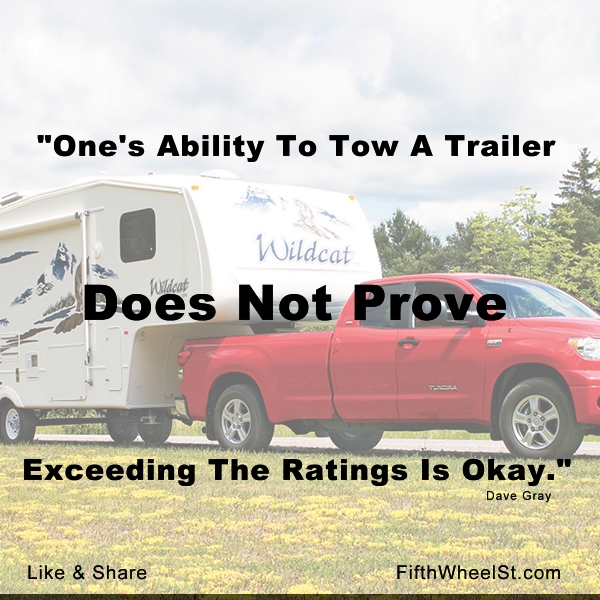DW_Gray
Well-known member
Interesting article just came out pertaining to this discussion.
Yes, Mark and I had some discussion about this upcoming article/blog last week. He has provided me some helpful guidance the past 4 years.
Interesting article just came out pertaining to this discussion.
Dave (DW), do you have a 1 ton chart that shows the Chevy and Ram 4x4 DRW? The 1 ton chart currently shows only the Fords.
Thanks!
I don't know if it's still as bad as it was, a few years ago, but RV manufacturer's and salespeople were very misleading as well with their "1/2 ton towable" marketing. Being professionals that are "supposed to be knowledgeable" in their field it would be hard to say they erroneously relied on truck manufacturer's data.
There may be a few???
My daughter has a 2014 F150 Supercrew (SCREW) 5.0L V8 that has a fifth wheel tow rating of 9,300 lbs. She would like to get a trailer this spring and I'm suggesting she consider a fiver instead of a bumper pull. The three I recommend... Prowler 22P or Elkridge e22 both @ 7,000 dry / 9,990 GVW or KZ has a small 265TH Toy Hauler that's 6,000 dry / 8,800 GVW.
She has seen the Elkridge and likes it, very nice finish with a large bath. I think she'll be OK with 2,000 lbs for cargo before it would break out of the trucks tow rating. I'm partial to toy haulers, so if I had an F150, I'd get the KZ.
That leaves NO 1/2 ton 5th wheels.
Also, I'm providing adequate educational information and tools so that all can perform their own research for which all are responsible for anyway. It's not my responsibility to do the homework that others should be doing.
Dave I think most people "want" to operate their rig safely. However there are a number of less then professional sales people, truck and RV, who will give them erroneous or misleading information, either because they don't know or they want to make the sale. Also, lets face it, you sometimes have to dig really deep into manufacturer's specs to get the information you need to make an informed decision. As you pointed out, there are so many options, models, drive configurations, etc on trucks out there, each with their own tow capacity.

I've decided after following this thread and punching my daughter's trucks numbers into the RV Tow Check app,
there is "NO 1/2 ton 5th wheel" under the 6000 lbs GVWR, that her F150 should be able to safely tow!!!
Dad is going to wise up and recommend she shop for a bumper pull.
Well, there is this 19 foot Scamp with a single axle rated at 3500 pounds and the dry weight of 2200-2800 pounds. IMHO, why bother.
